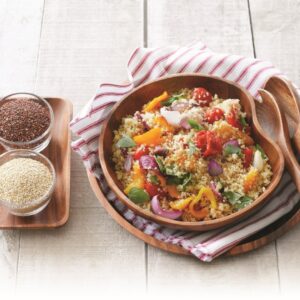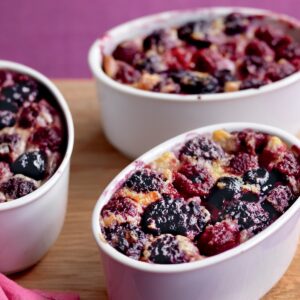
Dietitian Juliette Kellow explains what vitamin E is good for and where you can find this cell-protecting antioxidant in everyday foods.
Vitamin E is an antioxidant that helps to protect our cells from damage caused by harmful molecules called free radicals. In particular, vitamin E keeps our skin and eyes healthy and strengthens our immune system.
What happens if I don’t get enough vitamin E?
In many Western countries, deficiencies of vitamin E are uncommon, Except in people on a very low-fat diet or who have a health condition that affects vitamin E absorption.
What happens if I have too much vitamin E?
Most people are able to tolerate high levels of vitamin E without experiencing any side effects. But, to be on the safe side, when it comes to taking supplements, the Department of Health recommends no more than 540mg a day.
How much vitamin E do I need each day?
Vitamin E recommendations vary from country to country. The UK recommends 3mg-4mg a day for women and men respectively. The US has a Recommended Daily Allowance of 15mg vitamin E. New Zealand and Australia have a Recommended Daily Intake of 7mg for women and 10mg for men.
These variations are because our needs for this nutrient are largely based on the amount of polyunsaturated fats we have in our diets – as a rule, higher intakes of polyunsaturates mean we need more vitamin E.
Foods high in vitamin E
| Food | (mg vitamin E) |
|---|---|
| 30g sunflower seeds | 11.3 |
| 30g hazelnuts | 7.5 |
| 30g almonds | 7.2 |
| 140g farmed salmon (grilled) | 5.5 |
| 1 tablespoon sunflower oil | 5.4 |
| 30g pine nuts | 4.1 |
| 1 small avocado | 3.2 |
| 30g unsalted peanuts | 3 |
| 30g fortified bran flakes | 2.5 |
| 1 tablespoon canola or vegetable oil | 2.4 |
| 125g can sardines in tomato sauce | 2.3 |
| 30g Brazil nuts | 2.2 |
| 1/2 large can chickpeas (120g drained) | 1.9 |
| 80g blackberries | 1.9 |
| 1 tablespoon corn oil | 1.9 |
| 1 tablespoon groundnut oil | 1.7 |
| 80g butternut squash (baked) | 1.5 |
| 80g broccoli (steamed) | 1.5 |
| 30g pecan nuts | 1.3 |
| 1 teaspoon reduced fat spread (41-62% fat) | 1.3 |
| 140g cod (baked) | 1.3 |
| 80g watercress | 1.2 |
| 30g pistachio nut or walnuts | 1.2 |
| 80g kale (boiled) | 1.1 |
| 1 egg | 0.8 |
| 1/2 red capsicum/pepper | 0.8 |
| 80g blueberries | 0.8 |
| 1 teaspoon low-fat olive oil spread (26-39% fat) | 0.7 |
| 1 teaspoon peanut butter | 0.7 |
| 200g baked beans | 0.7 |
| 80g Brussels sprouts (steamed) | 0.7 |
| 10 olives | 0.6 |
| 200g whole meal pasta | 0.5 |
Will taking vitamin E supplements make my skin glow?
Vitamin E is important for healthy skin, but there’s no evidence that taking a large amount in supplement form will help to reduce wrinkles or give you a better complexion. Similarly, while vitamin E is a common ingredient in face creams and anti-ageing potions, there’s little evidence to suggest applying it to the skin is truly beneficial – any improvement may simply be due to the moisturising effect of the lotion. There’s also no medical evidence to suggest that applying creams containing vitamin E to scars or stretch marks will improve their appearance.
What about taking vitamin E supplements?
High doses of vitamin E have been implicated in promoting health and protecting against many diseases, including heart disease, Alzheimer’s, age-related macular degeneration and certain cancers. But so far research has provided mixed and inconclusive results – more studies need to be carried out before taking supplements is recommended. Instead, the focus should be on eating plenty of foods that are naturally rich in vitamin E.
Where do I find vitamin E?
It’s found in a wide range of foods, but the best sources are vegetable oils, such as corn and sunflower oil. Vitamin E is also present in nuts, seeds, avocado and green vegetables. Because it’s a fat-soluble vitamin, vitamin E is stored in the body, so we don’t need to have it in large amounts on a daily basis.
Article sources and references
- Mohammad Abid Keen and Iffat Hassan. Vitamin E in dermatology. Indian Dermatol Online J. 2016 Jul-Aug; 7(4): 311–315. doi: 10.4103/2229-5178.185494https://www.ncbi.nlm.nih.gov/pmc/articles/PMC4976416/#:~:text=Vitamin%20E%20is%20an%20important,as%20a%20free%2Dradical%20scavenger.
- Vitamin E and Skin Health. Linus Pauling Institute, Micronutrient Information Center, accessed 30 November 2020https://lpi.oregonstate.edu/mic/health-disease/skin-health/vitamin-E
- Saliha Rizvi, et al. The Role of Vitamin E in Human Health and Some Diseases.Sultan Qaboos Univ Med J. 2014 May; 14(2): e157–e165. Published online 2014 Apr 7.https://www.ncbi.nlm.nih.gov/pmc/articles/PMC3997530/
- Regina Brigelius-Flohé, et al. The European perspective on vitamin E: current knowledge and future research.The American Journal of Clinical Nutrition, Volume 76, Issue 4, October 2002, Pages 703–716, https://doi.org/10.1093/ajcn/76.4.703https://academic.oup.com/ajcn/article/76/4/703/4677430
www.healthyfood.com










